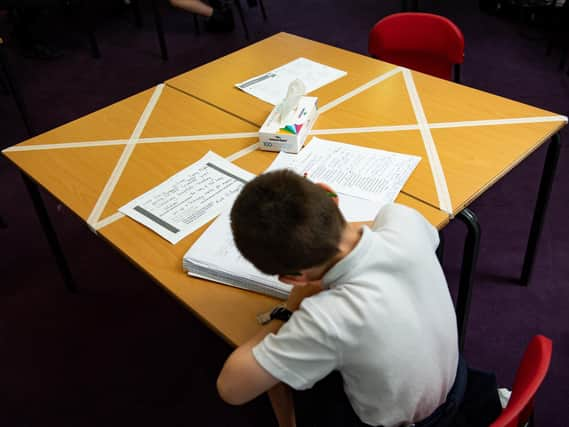Survey reveals thousands of pupils missing school due to Covid-19 in Wakefield


With falling attendance rates across England, but lowest in parts of the north, the Association of School and College Leaders is calling for the Government to provide more support and guidance to schools.
The Department for Education's survey of school attendance showed 5,588 pupils were absent from Wakefield schools on October 15 – with an overall attendance rate of 89%.
Advertisement
Hide AdAdvertisement
Hide AdOf these, 58% were absent from secondary schools, 41% from primary schools and around 2% from special schools.
The survey only looked at state-funded schools, of which 86% responded, so it is likely even more pupils were off throughout the area.
The figures, which were placed in the House of Commons library following a written question from MP Margaret Greenwood, showed the total attendance rate across England was 89% – down from 90% a week earlier.
The DfE said up to 412,000 children did not attend school for Covid-19 related reasons, with the majority self-isolating due to potential contact with a case of coronavirus.
Advertisement
Hide AdAdvertisement
Hide AdMore than a fifth of schools said they had one or more pupils self-isolating who had been asked to do so due to potential contact with a case of coronavirus inside the school.
Attendance rates varied greatly across the country, with secondary school attendance in Knowsley, in the North West, the lowest (61%), as infection rates rose and Tier-3 restrictions were imposed.
In Wakefield, 85% of secondary pupils were in class on October 15.
This was higher than the average across Yorkshire and the Humber, of 81%, which was the joint-lowest in England.
Advertisement
Hide AdAdvertisement
Hide AdParts of London recorded secondary school attendances as high as 94%, close to the usual national average.
The Northern Powerhouse Partnership has called for coursework to be used to assess GCSE and A-Level students instead of exams, to avoid the risk of a "similar fiasco" to this summer.
Head of policy for the partnership Sarah Mulholland said: “Northern students are the ones currently being impacted negatively by high infection rates and self-isolation.
“We urge the Government to commit to continuous assessment as it is a fairer alternative to the proposed examination plan.
Advertisement
Hide AdAdvertisement
Hide Ad“Assessing children this way, if it is planned in advance, may in fact be more rigorous than what is proposed if plans were to have to change at short notice.”
While the Government has said exams will go ahead in 2021, but held three weeks later than usual, the National Education Union said the mistakes of 2020 risk being repeated.
Avis Gilmore, deputy general secretary of the NEU, said: "We need to see a reduction in what is assessed, and a serious conversation with the profession to ensure a robust national system of moderated centre-assessed grades.
“Decisive action is needed to ensure schools and colleges have a clear path forward, giving students and their families the reassurance that an examination system is in place that ensures fairness across the country.”
Advertisement
Hide AdAdvertisement
Hide AdA DfE spokeswoman said schools were expected to provide pupils with remote education when they were self-isolating and headteachers could decide how to use their school’s premium allocation funding to tackle the impact of lost teaching time on pupils.
She added: “Exams are the fairest way of judging a student’s performance, which is why they will go ahead next year, underpinned by contingency measures developed in partnership with the sector.
“Over the coming weeks we will jointly identify any risks to exams and the measures needed to address potential disruption, with fairness for students continuing to be our priority.”